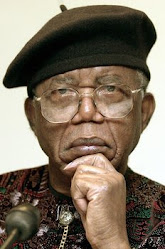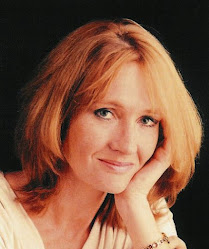
Uwem Akpan, the brilliant author of "Say You're One of Them" (one of the most impressive debuts of 2008), fields questions from Incessant Scribble's Osondu Awaraka:
1. How did you get news of Oprah’s endorsement?
Thanks for coming to interview me…Oprah herself called me. I was so excited about that call. I was talking to a parishioner in our parish in Mushin, Lagos. In some ways it was strange. It took me quite a while to take it in. To tell you the fact, I have not recovered yet. It’s one of those things you can’t even dream of,  you know what I mean? I used to think Oprah calls people like Obama and Beyonce…not some priest working in a slum in Lagos! Endorsement pass endorsement, as we say in Nigeria.
you know what I mean? I used to think Oprah calls people like Obama and Beyonce…not some priest working in a slum in Lagos! Endorsement pass endorsement, as we say in Nigeria.
2. How did it feel to sit down with Oprah and answer questions from her and all the people who wanted to let you know how much your book has inspired and affected them? Was it surreal at anytime?
 you know what I mean? I used to think Oprah calls people like Obama and Beyonce…not some priest working in a slum in Lagos! Endorsement pass endorsement, as we say in Nigeria.
you know what I mean? I used to think Oprah calls people like Obama and Beyonce…not some priest working in a slum in Lagos! Endorsement pass endorsement, as we say in Nigeria.2. How did it feel to sit down with Oprah and answer questions from her and all the people who wanted to let you know how much your book has inspired and affected them? Was it surreal at anytime?
Yes, that is the word to use “surreal”. Yes, to be in that studio and be communicating with Anderson Cooper of CNN and all the folks on Skype was something else….But it was very nice to be there because Oprah is a good host. She makes you relax. She is very down to earth. Now I know that what you see on that TV is what you get when you meet her in person. I think this is why America loves and adores her.
3. Was it difficult to get this book published? How did it happen?
3. Was it difficult to get this book published? How did it happen?
It should have been difficult but it was not. Once my first story got into the New Yorker mag in my first year of writing school, four big publishers asks me for contracts. But I was not ready yet and delayed for a year when my second story got into the New Yorker. Then 12 publishers became interested. I got an agent who ran an auction in New York City for them. There were two others in the UK and Italy.
4. Why did you delay? I mean why did you not secure a contract after the first story?
4. Why did you delay? I mean why did you not secure a contract after the first story?
I wanted to be sure of the terrain. This was something new. I just was not ready. I wanted to finish writing school. So I waited till I finished writing school, till my heart said yes.
5. Your prose is candid in its description of the horrors these children face. There is the use of the f-word in one part of the book; there is that disturbing scene with Fofo Kpee in “Fattening for Gabon”. Did your office as a Jesuit priest force you to censor your prose in any way?
5. Your prose is candid in its description of the horrors these children face. There is the use of the f-word in one part of the book; there is that disturbing scene with Fofo Kpee in “Fattening for Gabon”. Did your office as a Jesuit priest force you to censor your prose in any way?
Did you tone down or take out scenes people might deem inappropriate for a priest to describe? No one tells me what to write or how to write. I must say though that my editors suggested that I shortened some painful passages for the sake of the readers and also that I should dilute the pidgin English for the sake of Western readers…there was just no way I could have done either of this. So to answer your question, my priestly vocation did not hinder my candid description of the horrors these children face. Why should it?
6. Islam and religion in general are subjects people handle very delicately. Did you worry about how readers would react to “Luxurious Hearses”?
6. Islam and religion in general are subjects people handle very delicately. Did you worry about how readers would react to “Luxurious Hearses”?
It was a difficult story to write. But there comes a time you just want to write and say what you think should be said. I have criticized even my Church in that story. If the Christians had forgiven Jubril at the end, things would have been different. But they did not. And what does that say about Christians? Some Muslims also came out very well in the story, like the man who hid Jubril at the risk of having his whole household killed…I think people are very afraid to confront these issues or even to count the bodies after every religious conflict in Nigeria. So the local press normally brings down the death figures to check reprisal violence…followed by a hasty mass burial by the government, instead of fishing out the big politicians who instigate these killings. I think fiction allows you to enter more fully into something like this. We need this dialogue in Nigeria. We need this dialogue in our world. You can’t have that dialogue when the killing is raging. We should have this sincere dialogue when things are calm.
7. You bagged a creative writing degree in 2006. Why did you take the course? Had you already begun penning any of these short stories?
7. You bagged a creative writing degree in 2006. Why did you take the course? Had you already begun penning any of these short stories?
I knew I needed to improve my writing. I knew my writing could be better. And the University of Michigan writing program did that for me. Yes, I had already written the first drafts of most of the stories before I got there. So I applied what I learnt in the program to my work. Writing programs may not be for everybody though. You need to have a sense of what you need to develop your writing. I had nobody to show my work to, as all our successful writers live abroad.
8. Yes, our most prominent writers are overseas. Writers and artists in Nigeria are terribly frustrated. You’ve been there; you know how bad it can get. What do you think needs to be done to create a healthy publishing industry and a conducive environment for writers?
8. Yes, our most prominent writers are overseas. Writers and artists in Nigeria are terribly frustrated. You’ve been there; you know how bad it can get. What do you think needs to be done to create a healthy publishing industry and a conducive environment for writers?
First, the government must do something about education. Are children writing essays in school? Are the teachers marking these essays? I say this because a lot of people want to write in a place like Nigeria, but they just don’t have the basics! Many university students would like to write; they want to work, but too many of them can’t even write letters when they graduate. It is a serious embarrassment to the country. The teachers are not treated well too. Employers in Nigeria are equally very frustrated by what the university churns out…it is into this system, if it is working, that you introduce writing programs. South Africa is beginning to do this. America and Europe are doing this. Second, a few good publishing houses are coming up. They are still fragile, but I believe they will grow with time. They need the financial muscle and clear vision to hire editors, people who will groom a young talented Nigeria writer. These editors need to be paid well, that way they can focus. Editing someone’s work is not a joke. It is not something you do while on the side you are running a kiosk selling bread and udara. If this happens, the publishing houses can publish great stories or books and then be in a position to sell the rights to foreign publishers. What is happening now is the reverse. And maybe it is like our crude oil now. We have the crude oil, but no working refinery. What to do? We send the crude abroad and then bring in the refined product. Why can’t we refine that oil in the Niger Delta? Why can’t we groom our writers at home? Third, we don’t need the kind of show of shame that was on parade in Abuja a few weeks ago during the NLG Nigeria Prize for Literature. That night should not be for politicians, but writers. But I heard the shortlisted writers did not even have invitation cards and were not there!
9. Who are your favorite authors?
9. Who are your favorite authors?
I am very eclectic. Otherwise, I keep going back to the Bible.
10. What do you do to relax?
10. What do you do to relax?
I watch soccer. I take long rides. I visit families. I eat out with friends. The parish, I have to say is a busy place with more than 13,000 parishioners. So you may not be able to get away to do these things.
11. Do you have any scheduled book tours and book signings?
11. Do you have any scheduled book tours and book signings?
Yes, I am going around the USA now, reading and answering questions and signing books. As soon as my book is published in Nigeria in January I will do the same.




















